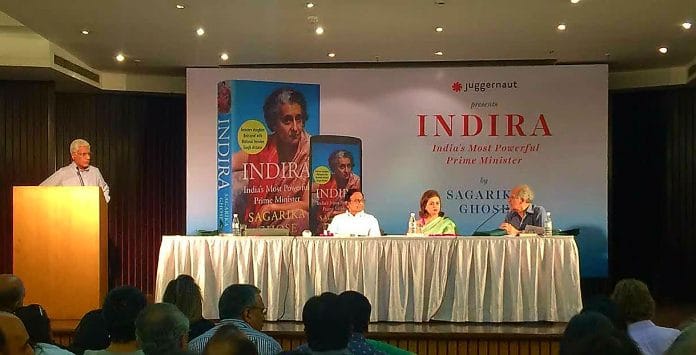The release of a book on the late prime minister gives an opportunity to examine her legacy and the relevance of its lessons today.
AADYA SINHA
“Has history been unkind to Indira Gandhi,” was a question posed to journalist Sagarika Ghosh at the launch of her book ‘Indira: India’s Most Powerful Prime Minister’, in the capital on Friday. Pausing for a moment, Ghosh smiled and then replied, “I think we only have to see the throngs of people who crowd her memorial to answer that. The number of people there are more than those at Panditji’s (Jawaharlal Nehru’s) memorial, or even Rajghat (Mahatma Gandhi’s memorial). To the public she is still an Iron Lady.”
The launch was followed by a conversation between Ghosh and two people seen as partisan rivals, former union ministers P. Chidambaram and Arun Shourie. Covering ground from Indira Gandhi’s appointment, through the Simla agreement, the Bangladesh War and her decision to declare Emergency, the event discussed the political and the personal characteristics of the enigmatic woman in equal parts.
Admitting that declaring Emergency hadn’t been the wisest decision, Chidambaram said, “While there was a tangible threat to law and order, declaring emergency was the wrong answer. Perhaps a more secure Indira Gandhi would have made a better decision.” He did, however, go on to commend her for owning up to her mistake and holding elections despite knowing she would lose. Arun Shourie too praised the former prime minister for what he called her “fighting spirit”.
Even as the conversation spiralled to scandalous inquiries into Indira Gandhi’s personal life, it ended on a sobering note of remembrance. On being asked if there were any parallels between what was happening today and what happened during the Emergency, Shourie spoke about an “institutionalised fear” that he senses in journalists and civil servants and how the “use of money bills is making the Rajya Sabha irrelevant”. He also lamented the manifold increase in what he said was the scale of exaggerations and falsehoods.
Chidambaram agreed and said that he saw a resemblance of “aspects of what happened during the emergency”. He mentioned the “stifling of dissent” and the “targeting of NGOs”. The worst of these aspects according to him were “orchestrated events of mob violence”, he said and referred to the lynching by suspected cow vigilantes in Jharkhand. Responding to questions on the Congress being a weakened opposition, Chidambaram admitted to the Congress being “institutionally weak”, and facing “a formidable political machinery in the form of the RSS”.
Here, Indira Gandhi made a reappearance with Ghosh recalling her spiritedness and fearlessness after a landslide defeat in the 1977 elections and revival thereafter. Be it as “James Bond in a Khadi Sari”, “India’s Iron Lady”, or “an indecisive woman”, as moderator Karan Thapar said, “Indira Gandhi is too tantalising to let go so easily”.






